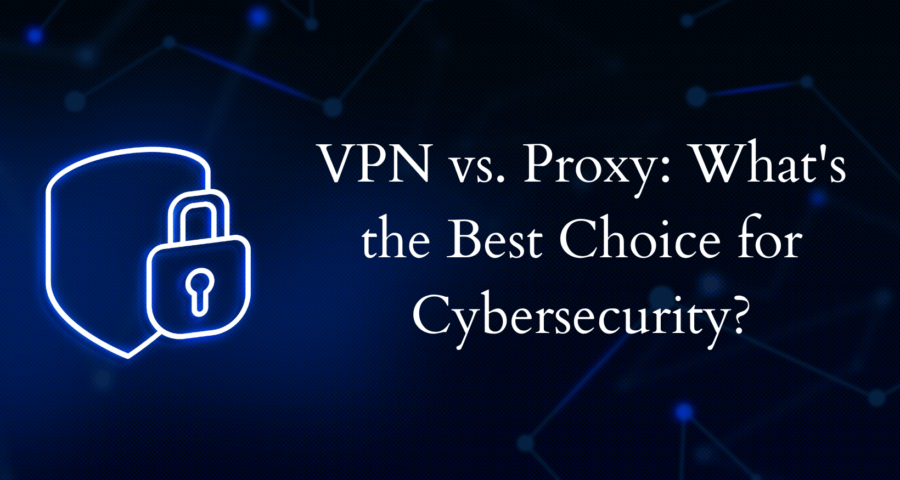Let’s understand today about VPN vs. Proxy. In today’s digital age, online security and privacy have become paramount concerns. Whether you’re protecting sensitive data, avoiding geo-restrictions, or safeguarding your anonymity, you’ve likely come across two popular tools: VPNs (Virtual Private Networks) and proxies. Both offer solutions for enhancing your cybersecurity, but they have distinct differences that make them better suited for specific situations. In this blog, we’ll explore the intricacies of VPNs and proxies, helping you determine which is the best choice for your cybersecurity needs.
Understanding VPNs
What is a VPN?
A Virtual Private Network (VPN) is a technology that establishes a secure, encrypted connection between your device and a remote server. This connection routes your internet traffic through the server, masking your IP address and protecting your data from prying eyes.
VPN Features for Cybersecurity
Encryption and Data Protection: VPNs offer robust encryption, safeguarding your data from potential interceptions or hacking attempts.
IP Masking and Anonymity: By rerouting your traffic through remote servers, VPNs effectively hide your IP address, enhancing your online anonymity.
Tunneling Protocols for Secure Connections: VPNs employ various tunneling protocols like OpenVPN, L2TP, and IKEv2, ensuring secure and private internet connections.
Understanding Proxies
What is a Proxy?
A proxy server acts as an intermediary between your device and the internet. When you use a proxy, your internet traffic goes through the server before reaching the destination, which can help you access geo-restricted content or maintain some level of anonymity.
Proxy Features for Cybersecurity
IP Masking and Access Control: Proxies mask your IP address, granting you limited anonymity, and they can be configured for access control.
Types of Proxies: Proxies come in different types, such as HTTP, HTTPS, and SOCKS proxies, each with its specific use cases.
Limitations in Data Protection: Unlike VPNs, proxies generally lack encryption, which means your data is not as secure when transmitted through them.
VPN vs. Proxy: Key Differences
Security and Encryption
VPNs: Offer strong encryption and comprehensive security features, making them ideal for situations where data protection is crucial.
Proxies: Provide limited security and can leave your data vulnerable, as most don’t include encryption.
Anonymity and Privacy
VPNs: Ensure complete anonymity by hiding your IP address and encrypting your traffic.
Proxies: Offer limited anonymity, making them suitable for unblocking content but not ideal for privacy.
Connection Speed
VPNs: Tend to be slower due to encryption, which might not be ideal for bandwidth-intensive tasks.
Proxies: Are faster since they lack the encryption overhead but come with security trade-offs.
Use Cases
VPNs: Best suited for comprehensive cybersecurity, secure browsing on public Wi-Fi, and protecting sensitive data.
Proxies: Ideal for bypassing geo-restrictions, accessing content faster, and in situations where strong security is not the primary concern.
When to Choose a VPN
Scenarios for VPN Usage
Secure Browsing on Public Wi-Fi: Public Wi-Fi networks are often unsecured, making them vulnerable to cyber threats. A VPN safeguards your connection, ensuring your data remains private.
Protecting Sensitive Data: If you’re handling sensitive information, such as financial transactions or corporate data, a VPN is a must to keep it secure.
Privacy and Anonymity Concerns: For individuals who prioritize online privacy and anonymity, a VPN is the go-to solution.
VPN Service Providers
When choosing a VPN, consider the following factors:
Logging Policy: Look for VPN providers with a strict no-logs policy to ensure your data isn’t stored or monitored.
Server Locations: More server locations mean better flexibility and access to geo-restricted content.
Tunneling Protocols: Different protocols offer varying levels of security and speed, so choose one that suits your needs.
User-Friendly Apps: User-friendly applications make it easier to set up and use your VPN on different devices.
Customer Support: Good customer support ensures you can get assistance when you need it.
For recommendations, some popular VPN services include ExpressVPN, NordVPN, and CyberGhost.
When to Choose a Proxy
Scenarios for Proxy Usage
Bypassing Geo-Restrictions: If your primary goal is to access region-locked content, a proxy can help you appear as if you’re browsing from a different location.
Faster Internet Access: Proxies can provide faster internet speeds, making them ideal for tasks like streaming or online gaming.
Types of Proxies
HTTP, HTTPS, and SOCKS Proxies: Each type has its own advantages and use cases, so choose the one that aligns with your needs.
Risks and Limitations
VPN Risks
Potential Logging by VPN Providers: Some VPN providers may keep logs of your online activities. It’s crucial to select a provider with a strict no-logs policy.
Legal and Ethical Considerations: Using a VPN to engage in illegal activities may lead to legal consequences. Always use VPNs responsibly and ethically.
Proxy Risks
Lack of Encryption and Data Protection: Proxies, especially free ones, often lack encryption, leaving your data exposed to potential threats.
The Possibility of Malicious Proxy Servers: Public proxies can be operated by malicious actors who may intercept or tamper with your data.
Conclusion: VPN vs. proxy
In the VPN vs. proxy debate, the choice ultimately depends on your specific needs and priorities. If your primary concern is data security, privacy, and anonymity, a VPN is the better choice. On the other hand, if you’re looking to access geo-restricted content quickly, a proxy can be more suitable.
Enhancing your cybersecurity is a personal journey, and understanding the differences between VPNs and proxies is the first step in making the right choice. Consider your online activities and choose the tool that aligns with your goals while ensuring that your online presence remains secure.


Leave a Reply